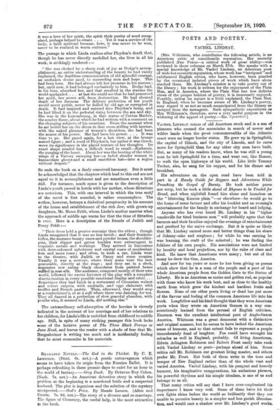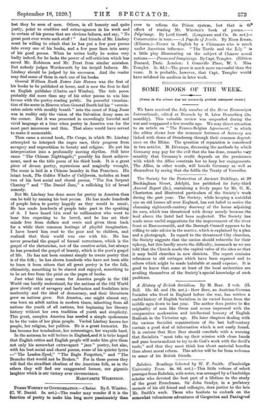POETS AND POETRY.
VACHEL LINDSAY,
[Mrs. Wilkinson, who contributes the following article, is an American critic of considerable reputation. Her recently published New Voices—a critical work of great ability—was reviewed in these columns on March 27th. She speaks with a special knowledge of Mr. Vachel Lindsay, an American poet of wide but eccentric reputation, whose work has " intrigued ''and exhilarated English critics, who have, however, been puzzled by the occasional isolated pieces of work which have alone reached them. Mr. Lindsay a mission is to take poetry out of the library ; his work is written for the enjoyment of the Plain Man, and in America, where the Plain Man has less definite views of the proper habitat of poetry, it is immensely enjoyed. Possibly, unless its nature is a little explained, the Plain Man in England, when he becomes aware of Mr. Lindsay's poetry, may regard it as not so much emancipated from the library as escaped from the menagerie. Such sympathetic expositions as Mrs. Wilkinson's, therefore, serve a very useful purpose in the widening of the appeal of poetry.—En. Spectator.] VACHEL LINDSAY comes of old American stock and is a son of pioneers who crossed the mountains in search of newer and wilder lands when the great commonwealths of the Atlantic coast were no longer border states. He grew up in Springfield, the capital of Illinois, and the city of Lincoln, and he cares more for Springfield than for any other city men have built. But, as many of his readers know, when he was still a young man he left Springfield for a time, and went out, like Homer, to walk the open highways of his world. Like little Tommy Tucker, also, he sang for his supper, and for his dinner and breakfast.
His adventures on the open road have been told in part in A Handy Guide for Beggars and Adventures While Preaching the Gospel of Beauty. He took neither purse nor scrip, but he took a, little sheaf of Ehynies to be Traded for Bread, and when nightfall found him alone and homeless on the " blistering Kansas plain "—or elsewhere—he would go to the home of some farmer and offer his booklet and an evening's entertainment for the family in exchange for board and lodging.
Anyone who has ever heard Mr. Lindsay in his " higher vaudeville for tired business men " will probably agree that the farmers and their families enjoyed the evenings of entertainment and profited by the naive exchange. But it is quite as likely that Mr. Lindsay earned more and better things than his share of Johnny-cake and sorghum ; for while he was earning he was learning the craft of the minstrel ; he was finding the folklore of his own people. His associations were not limited by locality and local prejudices, nor by the rules of class and kind. He knew that Americans were many ; but out of the many he drew the One, America.
And now for ten years or more he has been giving us poems which show that he is a man of the people and a poet of the whole American people from the Golden Gate to the Statue of Liberty. He is as American as maize and golden rod, as popular with those who know his work best, and as close to the healthy earth from which grow the kindest and hardiest fruits and flowers. None of our other poets living or dead has put more of the flavour and feeling of the common American life into his work. Longfellow and his kind thought that they were American poets when they wrote on American themes in a way con- scientiously learned from the perusal of English criticism. Emerson was the excellent intellectual poet of Anglo-Saxon America. Whitman was a great democrat with a distinctive and original manner, but he seems to have lacked the American sense of humour, and to that extent fails to represent a people immoderately fond of laughter. Poe could have wrought his miracles as well in England, probably. Of living Americans, Edwin Arlington Robinson and Robert Froet easily take rank with Vachel Lindsay as poets—perhaps ahead of him. Some critics call Mr. Robinson our greatest living master, and others prefer Mr. Frost. But both of them write in the tone and temper of New England rather than of the whole vast and varied America. Vachel Lindsay, with his pungent and homely humour, his imaginative exaggerations, his audacious phrases, his powerful rhythms and his simple idealism, is one of us and belongs to us a,ll.
That many critics will say that I have over-emphasized his importance I know very well. Some of them have let their own lights shine before the world so brilliantly that they are unable to perceive beauty in a simpler and less garish illumina- tion. and would cast a shadow over Mr. Lindsay's good works,
lest they be seen of men. Others, in all honesty and quite justly, point to crudities and extravagances in his work and to certain of his poems that are obvious failures, and say, "No great poet ever wrote such stuff !" And friends of Mr. Lindsay must be willing to admit that he has put a few poor poems into every one of his books, and a few poor lines into many of his good poems. When he writes badly he writes very badly indeed, for he lacks the power of self-criticism which has saved Mr. Robinson and Mr. Frost from similar mistakes. But nobody judges Wordsworth by his insipid failures. Mr. Lindsay should be judged by his successes. And the reader may find some of them in each one of his books.
General William Booth Enters Into Heaven was the first of his books to be published at home, and is now the first to find an English publisher (Chatto ant Windus). The title poem probably did more than any of his other poems to win him favour with the poetry-reading public. Its powerful visualiza- tion of the scene in Heaven when General Booth led his " vermin- eaten saints with mouldy breath " into the court of King Jesus was in reality only the vision of the Salvation Army man on the corner. But it was presented in exceedingly forceful and vivid language at a time when poetry in America was for the most part innocuous and thin. That alone would have served to make it memorable.
Then came a second book, The Congo, in which Mr. Lindsay attempted to interpret the negro race, their progress from savagery and superstition to beauty and religion. He put his interpretation into a profoundly moving rhythm. Still later came " The Chinese Nightingale," possibly his finest achieve- ment, used as the title poem of his third book. It is a great piece of dream poetry, mysterious and magically wrought. The scene is laid in a Chinese laundry in San Francisco. His latest book, The Golden Whales of California, includes at least two of his best social and choral poems, " The Sea Serpent Chantey " and " The Daniel Jazz," a rollicking bit of broad comedy.
But Mr. Lindsay has done more for poetry in America than can be told by naming his best poems. He has made hundreds of people listen to poetry happily as they would to music. He has made hundreds of people take part in the speaking of it. I have heard him read to millionaires who went to hear him expecting to be bored, and he has set their nun' da free from dollars and cents and given them back for a while their common heritage of playful imagination. I have heard him read to the poor and to children, and realized that their world was one with his. He has never preached the gospel of formal correctness, which is the gospel of the rhetorician, not of the creative artist, but always he has preached the gospel of beauty, which is the poet's gospel of life. Ho has not been content simply to create poetry that is of the folk ; he has shown hundreds who have not been able to learn it from others that all great poetry is for the folk, ultimately, something to be shared and enjoyed, something to to be set free from the print on the pages of books.
Just what this may mean for America people in the Old World can hardly understand, for the nations of the Old World grew slowly out of savagery and barbarism and feudalism into modernity and the ideal of democracy, and their literatures grew as nations grew. But America, one might almost say, was born an adult nation in modern times, inheriting from all nations the youth of all nations, but beginning her literary history without her own tradition of youth and simplicity. This great, complex America has needed a simple spokesman to be the voice of her plain people. Vaehel Lindsay knows her people, her religion, her politica. He is a great humorist. He has become her troubadour, her minnesinger, her wayside bard.
In the autumn he will lecture in England and it is to be hoped that English critics and English people will make him give them not only his somewhat extravagant " jazz " poetry, but also, with his best social and choral poems, some of his quieter lyrics —" The Leaden-Eyed," " The Eagle Forgotten," and " The Broncho that would not be Broken." For in these poems they will find the steadfast idealism of the American folk, as in the others they will find our exaggerated humor, our gigantic laughter which is our victory over circumstananc ce.
Munian Wiranassoar.







































 Previous page
Previous page